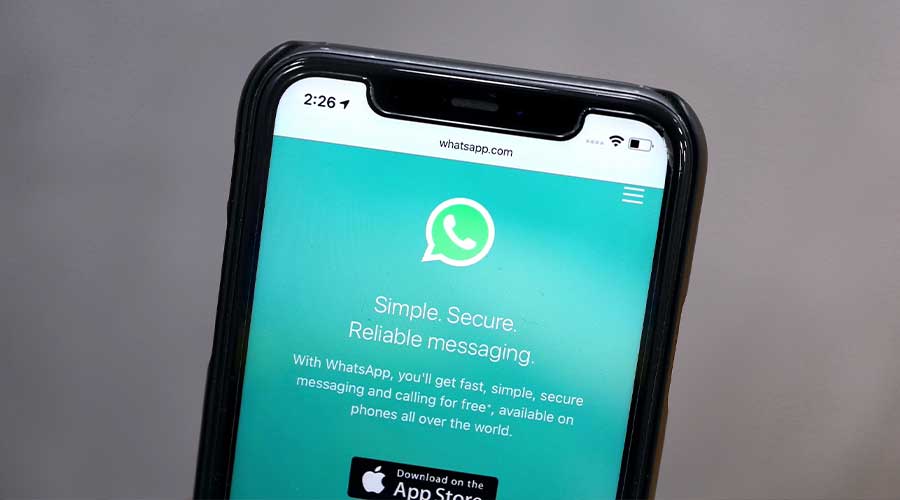WhatsApp users have until February 8 to accept new terms & privacy policy, while WhatsApp has reaffirmed that all messages are encrypted end-to-end to reassure the rattled users.
On everyone’s WhatsApp, a new notification has been popping up telling them that world biggest messaging application WhatsApp’s terms and policies are being updated. Users must accept these new terms by February 8, and WhatsApp has indicated that if they do not accept the new terms and agreements, users may not be able to access their WhatsApp accounts. The new policy was updated on January 4, 2021.
This new update has created a lot of controversy about the latest privacy policy, especially about the sharing of data with Facebook, which is its parent company.
What does WhatsApp share with Facebook?
The updated policy of Facebook-owned WhatsApp states that it can share your data with its family of companies to “facilitate, support and integrate their activities and enhance our services.”
It will be shared with Facebook whatsoever information WhatsApp gathers from you automatically, this includes your cell phone number and basic details you have.
How much you use WhatsApp, features you use, profile photo, status, and ‘about’ information is also collected and shared.
It also gathers information at the user level, such as what device you are using, your mobile network, IP address, and others. It also gathers and uses accurate position data, but with your permission, from your smartphone.
“We could use the information that we collect from them and use the information we exchange with them to help operate, develop, enhance, understand, customise, support and promote our services and their services, including the products of the Facebook corporation,” WhatsApp stated.
Facebook and its other products can also use your information to make recommendations for you, personalise features and content, help you complete purchases and transactions, and view relevant deals and advertising across the products of the Facebook business.
Facebook services include Facebook, Messenger, Instagram, Oculus Products, Facebook Shops, Portal-branded gadgets, Spark AR Studio, Audience Network, NPE Team apps and all other Facebook Inc. features, apps, technology, applications, products or services.
What about your messages?
WhatsApp has reiterated that it encrypts all messages end-to-end. This implies that the messages will not be accessed or read by either WhatsApp or third parties.
“Nothing you share on WhatsApp will be publicized on Facebook or any of our other family of apps for others to see, including your messages, pictures, and account information, and nothing you post on those apps will be shared on WhatsApp for others to see,” WhatsApp says.
Read more: Pakistan to develop its own messaging app: IT minister
After they have been sent, WhatsApp doesn’t store your messages. Messages are saved on the user’s computer and not on the servers of WhatsApp. They are removed from their servers until messages are sent.
WhatsApp servers store undelivered messages in encrypted form for up to 30 days in the process of delivering a message and if a message is still undelivered after 30 days, WhatsApp claims to delete it.
“When a user forwards media inside a post, we store the media temporarily on our servers in encrypted form to help deliver additional forwards more effectively,” adds WhatsApp.”
What about your transaction data?
However, with the launch of payments system in some countries and territories, company says that if you use WhatsApp Pay then with the updated policy, users have to agree with additional data sharing information which includes payment account and transaction information.
This is basic information as it requires to complete the transaction, such as mode of payment, shipping details and value of transaction.
What about ads?
WhatsApp does not tolerate ads on its services from third parties. “We have no purpose of announcing them, but we will update this privacy policy if we ever do so,” WhatsApp says.
Though, WhatsApp may use data it has about you to interconnect with you about its services and market its services and those of other Facebook businesses.
What about businesses and third-part services?
With the launch of WhatsApp Business, platform permits companies through its app to contact and communicate with clients. This could include making purchases through the app, sending you order confirmations, flight tickets, tickets to other events, etc.
Although chats between you and a company are encrypted end-to-end, WhatsApp says that it will be subject to the company’s own privacy practices until the message is sent.
Some businesses will be able to select the parent company of WhatsApp, which is Facebook, to store messages securely and respond to clients.
“Although Facebook may not use your messages automatically to alert you of the advertisements you see, companies may be able to use the chats they receive for their own advertising purposes, that could include Facebook advertising,” WhatsApp said.
What choice do you have?
You need to accept the current terms and conditions to continue using WhatsApp. If you do not want to, WhatsApp also recommends that your account be deleted.
Users who have already approved the updated terms and conditions but do not want WhatsApp to share details with Facebook or other companies will have further 30 days to opt-out and delete their account.
What happens if you delete your account?
WhatsApp says your undelivered messages are removed from its servers when you delete your WhatsApp account, along with all of your other data that it no longer uses to run and provide its services.
Users must verify that they not only uninstall WhatsApp, but must also delete their WhatsApp account. You can do this by going to Settings > Account and choosing ‘Delete my account’.
“Please note that it does not impact the details other users have about you when you delete your account, such as their copy of the messages you sent them,” WhatsApp privacy policy adds.





















